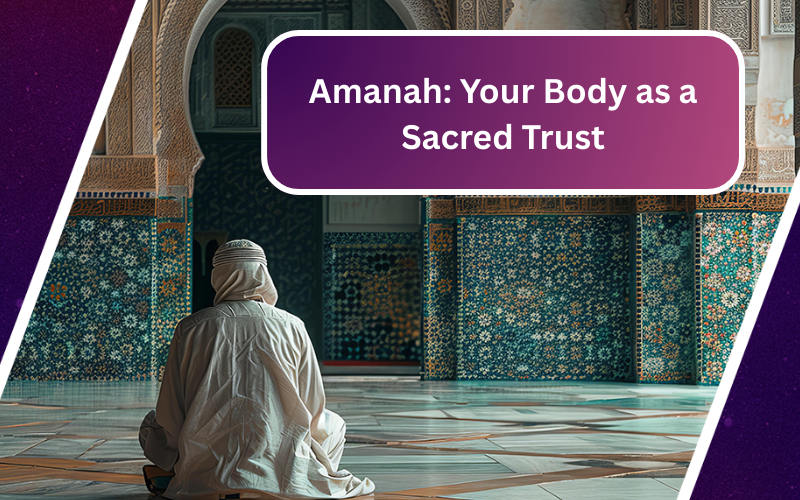In the Islamic tradition, one of the most profound concepts that shapes our relationship with ourselves is that of amanah (trust). While often discussed in relation to responsibilities and promises we make to others, there is a deeper dimension to amanah that pertains to our own bodies: the understanding that our physical form is not truly our own but rather a sacred trust bestowed upon us by Allah (SWT).
Understanding Amanah in Relation to Our Bodies
A fundamental Islamic principle is: we are caretakers, not owners, of what Allah has entrusted to us. Our bodies fall squarely within this trust. We did not create our bodies, nor do we have complete control over their functions. Rather, they are miraculous gifts that deserve proper care and maintenance.
In Surah Al-Baqarah (2:195), Allah commands: “And do not throw yourselves into destruction with your own hands.” Scholars have interpreted this verse to include the prohibition against neglecting one’s health or engaging in behaviors that damage the body.
Practical Health Tips to Honour the Amanah of Your Body
As custodians of the divine trust of our physical form, Muslims are encouraged to:
- Maintain proper nutrition: The Prophet Muhammad (peace be upon him) advised moderation in eating, saying: “The son of Adam does not fill any vessel worse than his stomach. It is sufficient for the son of Adam to eat a few mouthfuls to keep him going.” (Sunan Ibn Majah 3349)
- Stay physically active: Regular exercise maintains the strength and flexibility Allah blessed us with. The Prophet (peace be upon him) encouraged physical strength when he said: “The strong believer is better and more beloved to Allah than the weak believer, although both are good.” (Sahih Muslim 2664)
- Prioritise adequate sleep: Proper sleep is essential for physical recovery and mental clarity to fulfill our religious duties.
- Practice regular hygiene: Cleanliness is half of faith (at-tahara shatrul-iman), as taught by our Prophet (peace be upon him).
- Attend to mental health: A sound mind complements a sound body. The Quran repeatedly emphasises reflection, mindfulness, and spiritual practices that cultivate inner peace.
The Islamic Significance of Caring for the Amanah
Caring for our bodies goes beyond mere self-interest—it is an act of worship (ibadah). By honouring the trust of our bodies, we express gratitude to the Creator and demonstrate our commitment to using His gifts responsibly.
The early Muslim scholars recognised this connection between physical well-being and spiritual health. Imam Al-Ghazali wrote extensively about how proper care of the body facilitates worship and the pursuit of knowledge. When we neglect our health, we may find ourselves unable to pray, fast, or serve our communities effectively.
Preparing for Hajj: A Time to Renew Our Commitment
With the month of Dhul Hijjah approaching, the concept of amanah takes on added significance. The pilgrimage demands physical endurance and stamina, with pilgrims walking long distances, standing for extended periods, and navigating crowds in varying weather conditions.
Now is the perfect time to begin honouring the trust of our bodies with renewed commitment. By improving our physical condition before Hajj, we better prepare ourselves to fulfill this pillar of Islam with vigour and focus, allowing our spirits to soar without being hindered by preventable physical limitations.
Remember, caring for your body isn’t vanity—it’s fulfilling a sacred trust from Allah. As we look forward to the blessed days of Hajj, let us start today to honour the amanah of our physical forms, so that we may better honour all the trusts Allah has placed in our care.



